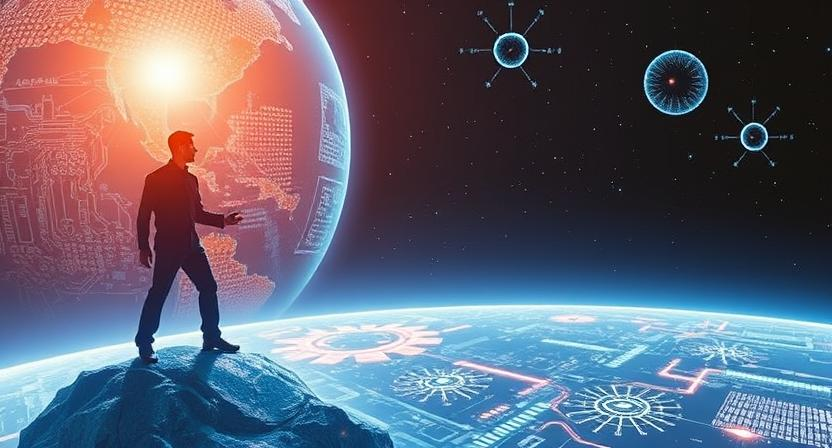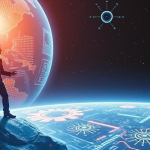As we look beyond 2050, it is clear that humanity is on the brink of an era defined by unprecedented technological advancements. Innovations in artificial intelligence (AI), biotechnology, space exploration, and quantum computing are set to revolutionize every aspect of life. The future promises to be a landscape where the boundaries between human and machine, physical and digital, reality and imagination blur. Here’s a glimpse into how emerging technologies will reshape humanity in ways we can only begin to imagine.
Artificial Intelligence: The Brain of the Future
AI is already an integral part of modern society, but by 2050, its capabilities will reach extraordinary heights. We will witness the emergence of Artificial General Intelligence (AGI), AI systems capable of human-like reasoning, learning, and problem-solving across multiple domains. These AI-driven systems will serve as decision-makers in governance, healthcare, and finance, ensuring efficiency and accuracy far beyond human capabilities.
Furthermore, AI-driven automation will revolutionize the workforce. While some jobs will become obsolete, new roles will emerge, emphasizing creativity, emotional intelligence, and ethical decision-making. AI will also enhance education by providing personalized learning experiences tailored to individual needs and cognitive styles.
Biotechnology: The Next Evolution of Humanity
The fusion of biology and technology will redefine human existence. Genetic engineering and CRISPR-based gene editing will eradicate hereditary diseases, enhance physical and cognitive abilities, and even extend human lifespan significantly. By 2050, we may see the first generation of genetically modified superhumans, designed to resist diseases and adapt to harsh environments, including space.
In the medical field, regenerative medicine will advance, allowing for the regrowth of organs and limbs using bioprinting and stem cell technology. Neurotechnology will enable direct communication between the brain and machines, unlocking possibilities such as memory enhancement, direct neural interfaces, and even mind-to-mind communication.
Space Colonization: Humanity’s Next Frontier
Space exploration is poised to expand human civilization beyond Earth. With private space companies like SpaceX and Blue Origin pushing the boundaries, colonization of the Moon and Mars is a tangible goal. By 2050, sustainable human habitats on Mars may become a reality, enabling humans to live, work, and thrive on another planet.
Asteroid mining will revolutionize resource acquisition, providing access to rare minerals and materials necessary for technological advancement. Space-based solar power stations will offer an abundant and renewable energy source, potentially solving Earth’s energy crisis.
Quantum Computing: A New Era of Problem-Solving
Quantum computing is expected to surpass traditional computing, unlocking solutions to complex problems that were previously impossible to solve. Industries such as pharmaceuticals, materials science, and cryptography will be transformed by quantum computing’s ability to simulate molecular interactions, discover new materials, and break encryption codes.
Quantum internet will emerge, offering ultra-secure communication and fundamentally altering cybersecurity. Governments, businesses, and individuals will rely on quantum technology to safeguard sensitive data, ensuring privacy and security in an increasingly digital world.
The Metaverse: A New Dimension of Reality
The metaverse will evolve beyond gaming and social networking into a fully immersive digital universe where people will work, socialize, and conduct business. Advancements in augmented reality (AR) and virtual reality (VR) will allow individuals to experience hyper-realistic simulations, enhancing remote collaboration, education, and entertainment.
As physical and digital realities merge, new economic systems will develop within the metaverse. Digital assets, powered by blockchain and decentralized finance, will reshape global commerce, making virtual real estate, AI-generated art, and digital identities as valuable as physical assets.
Ethical and Social Implications
While these advancements promise to improve human life, they also raise ethical and societal challenges. The potential for AI to surpass human intelligence poses existential questions about control and autonomy. Genetic modifications could create a societal divide between enhanced and non-enhanced individuals, leading to ethical dilemmas and inequalities.
Additionally, mass automation may disrupt economies, necessitating new policies such as universal basic income (UBI) to address unemployment. Privacy concerns will escalate as data collection becomes more invasive, requiring robust regulations to protect individuals from digital exploitation.
Conclusion
Beyond 2050, technology will redefine the very essence of humanity. AI will enhance intelligence, biotechnology will transform the human body, space colonization will extend civilization beyond Earth, and quantum computing will unlock new dimensions of problem-solving. However, as we navigate this technological evolution, it is crucial to balance progress with ethics, ensuring that these innovations serve all of humanity equitably. The future is not just about technology—it is about how we, as a society, choose to wield its power.






Leave a Reply